'This is the worst it's been:' Michigan's 911 centers struggle with vacancies, burnout, solutions
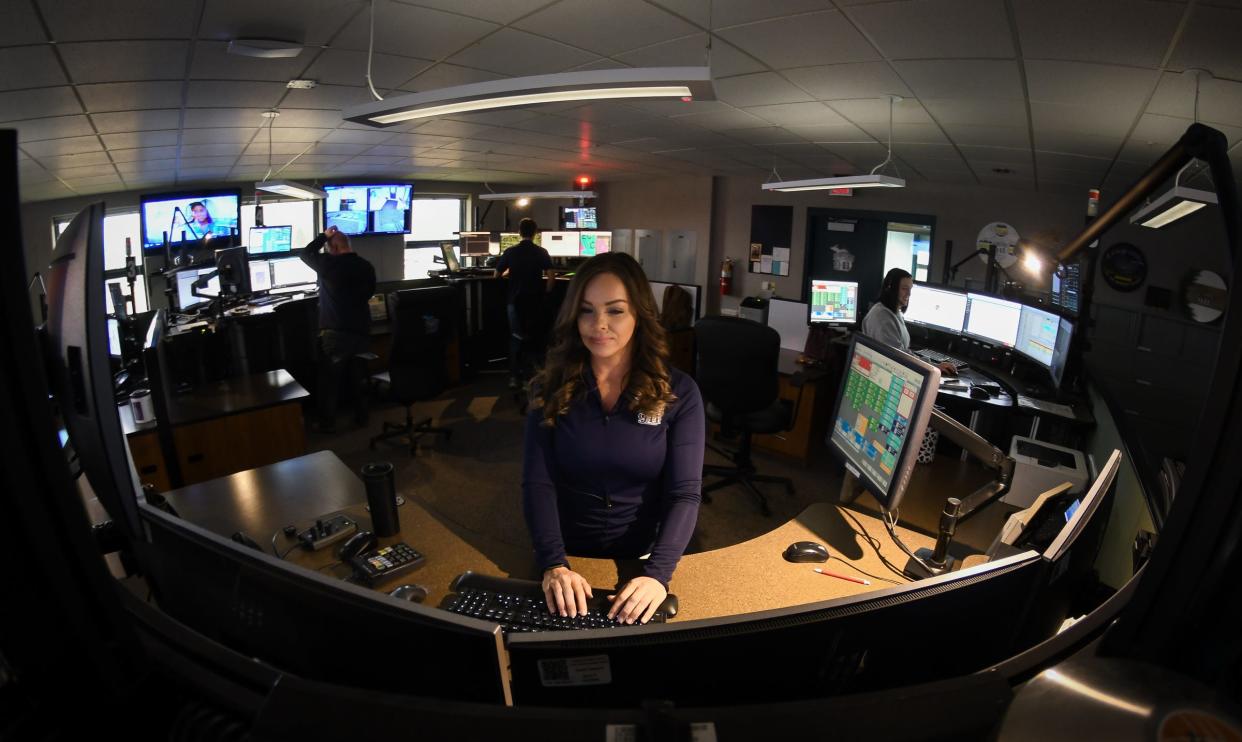
LANSING — Sherry Larner was eight months into her job as a 911 dispatcher with the city of Lansing when she found herself on the phone with a man who was distraught and suicidal.
She spoke to the man to try to calm him. Then she heard the sound of a gunshot, followed by a phone falling to the floor. The call, which came near the end of her shift, was over as suddenly as it began.
“I got up and walked out crying,” Larner, 51, said.
Twenty-four years later she still vividly recalls it as one of the most traumatic calls she’s ever taken.
Libby Howland knows firsthand the trauma Larner suffered — and how it affects dispatchers — after working the night of a mass shooting at Michigan State University in Eaton County's dispatch center.
Howland was in downtown East Lansing with her husband and two boys, ages 6 and 9, on Feb. 19 for “Spartan Sunday” to hand out handmade key chains and bookmarks to students dealing with the aftermath of the Feb. 13 shooting.
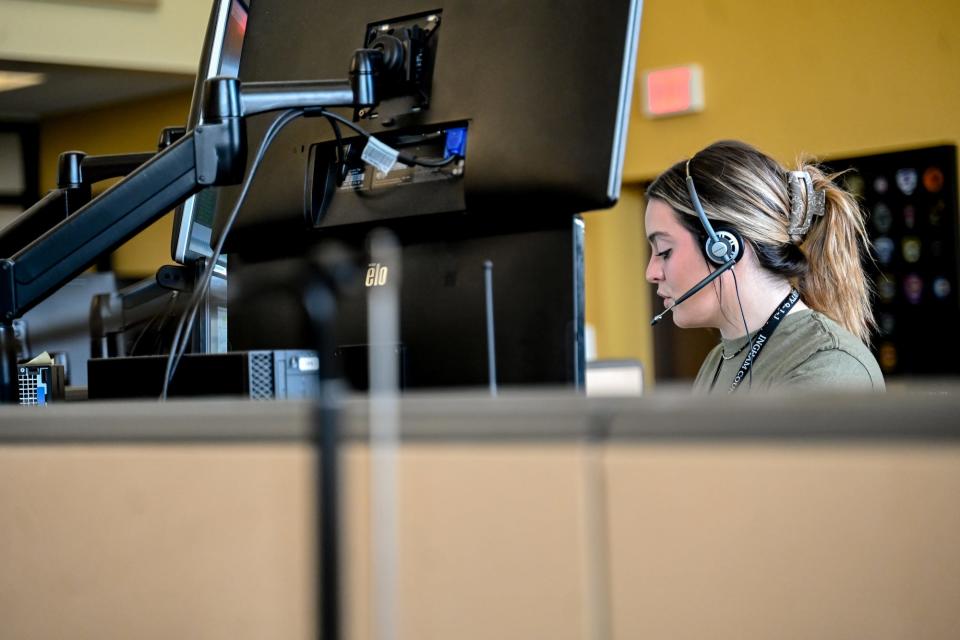
Six days after the incident, the totality of the hours she spent dispatching first responders to campus hit her.
As she crossed Grand River Avenue “there was a police car that went down the road with its lights and sirens on and I just immediately froze and started crying,” Howland said. Her husband, who knows all too well the wounds his wife’s job as a 911 dispatcher inflicts, steered their children away from her and “let me have that moment,” she said.
Dispatchers say their work is unpredictable, but immensely gratifying because they have the chance to save lives daily. But the mental wear and tear often leads to burnout. Low pay, high-stress levels and mandatory overtime because of chronically understaffed dispatch centers in Michigan and across the U.S. contribute to short careers in the profession for many.
Dispatchers say the solution to recruitment and retention is complicated and must include supporting their mental health and work-life balance, offering better compensation and benefits, and reclassifying dispatchers on a federal and state level as the first responders they’ve always been.
“When we talk about retention, and we talk about it a ton, what do we need to be doing?” Ingham County 911 Director Barb Davidson asked. “We need to make folks feel like there’s a light at the end of the tunnel.”
Mastering crucial skills
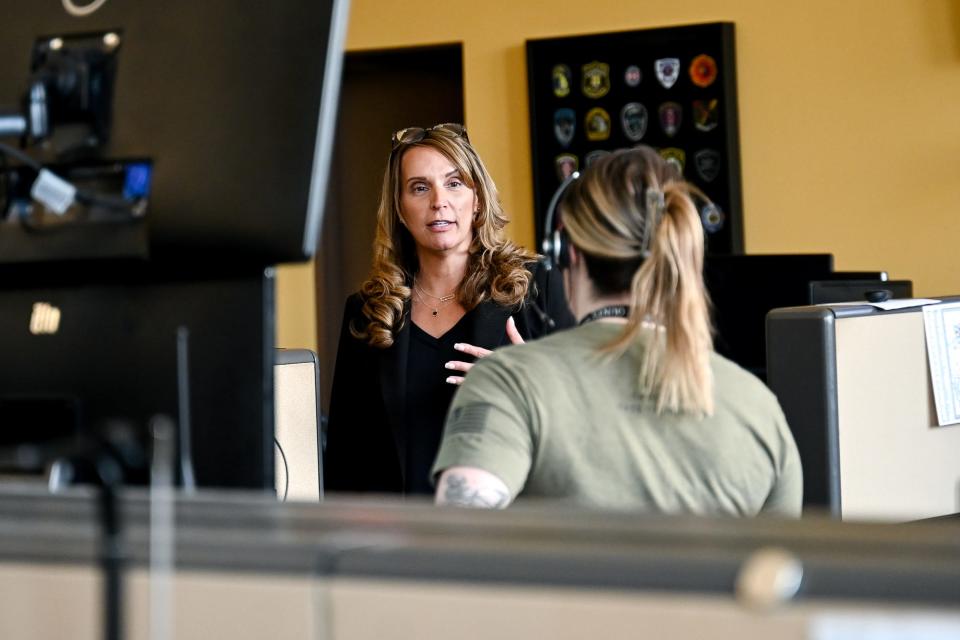
On a Sunday morning in April, Kyla Carranco sat at her desk inside Eaton County’s 911 Central Dispatch Center facing four large computer-aided dispatch screens. Dispatchers use them to help locate where a call is coming from, record information from incoming callers and first responders, transmit details to police, fire and emergency medical staff, and log every interaction.
While every call is different — and many last only three or four minutes, a lot can happen in that short time, said Carranco, a supervisor who’s been doing the work for 14 years. Dispatchers have to collect, record and relay crucial details, but they also make second-by-second judgment calls about the seriousness of an emergency, what help is needed, how dangerous it could be for the first responders, and whether they should stay on the line with a caller until help arrives.
There’s even a program that takes a dispatcher through questions they should ask in a medical emergency, then provides them prompts to help instruct someone through saving a life, including performing CPR or delivering a baby.
Carranco was studying criminal justice at MSU when a neighbor suggested she consider 911 dispatch. She fell in love with the job.
“I liked being somewhere where I was a part of solving the emergency and getting people the help, being on the front line without being out there in the elements,” she said.
Good dispatchers multitask, compartmentalize and think fast, but the desire to help people is what drives most of them, Davidson said.
“You have to have that ability to manage a super-high level of stress and while you're doing that, communicate very clearly and calmly,” she said. “You have to have a servant's heart to be able to continue to do it.”
Learning to deal with trauma

"Just suck it up and move on," Carranco remembers thinking to herself after a difficult call in 2009.
She was less than six months into her job at Ingham County 911 Central Dispatch, and still in training when she experienced one of her first traumatic calls as a dispatcher. Once it was over, she pushed it to the back of her mind and left it there for years.
“I wasn't even the call taker or the dispatcher for it,” she said about the incident in which police and co-workers dealt with the immediate aftermath of a mother killing two children before taking her own life. “I was sitting at a different desk that day.
“It was a very chaotic and graphic scene, and so the officers were yelling on the radio a lot and there was a lot of activity in the room,” she said. “It stuck with me, but back then it was like, ‘Don't talk about it. Don't let yourself feel anything about it.’”
Years later, when the incident surfaced during a session with her therapist, it shook her again.
“It was something that came up out of nowhere and I thought, ‘I shoved that way down in the recesses of my mind,’" Carranco said.
Prioritizing mental health is one of the job’s biggest challenges, Howland said. Dispatchers must set their own emotions aside when they’re working, but they need to process them once their shift is over, she said.
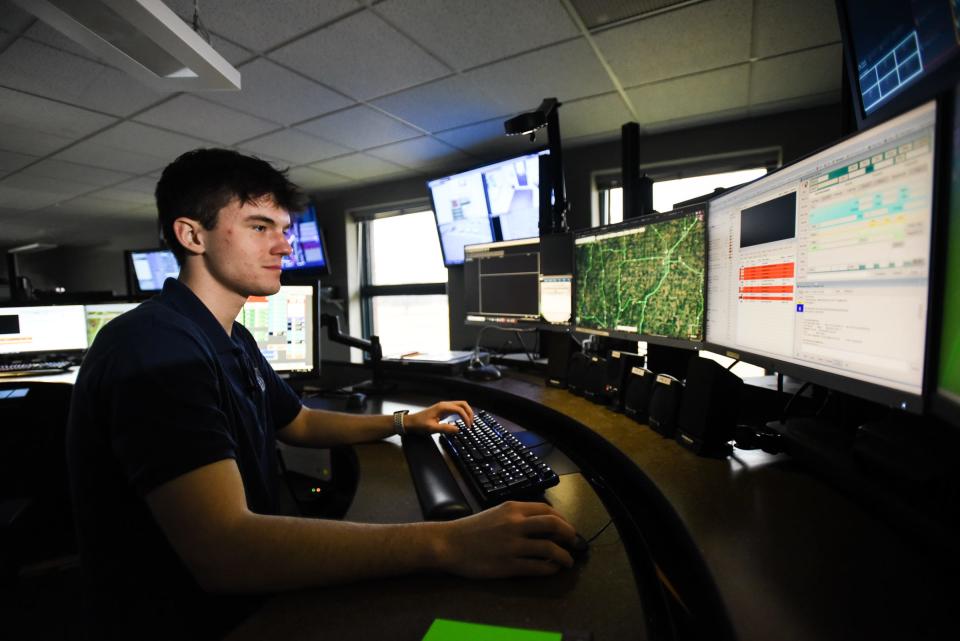
“We do not come in every day, sit down at a computer, enter data, answer phones, and then go home at the end of the day,” Howland said. “That is not what our job is. Our job is serious preparation for how to handle these situations, both physically at the console and mentally as a person to be able to deal with someone else's trauma and not have it affect you in that moment.”
When Davidson started her career in 2001, dispatchers didn’t talk about the calls they struggled with for fear it would be seen as a weakness, she said.
“Then a few really brave people started talking about it," she said. Now dispatchers and their leaders receive training to recognize and address mental health issues.
Joni Harvey, state 911 administrator for the State 911 Office, said that shift is recent. It began a decade ago, but in the last few years has come to the forefront of the profession.
Supervisors now regularly check in with staff after traumatic calls, inform them of an incident’s outcome and talk through emergencies after the fact.
“You get an opportunity to talk about the incident,” Eaton County 911 Director Kelley Cunningham said. “Sometimes just being able to talk to others that were involved in the incident allows you to get that off your shoulders and then on top of it.”
Vacancies, overtime, and turnover prevalent
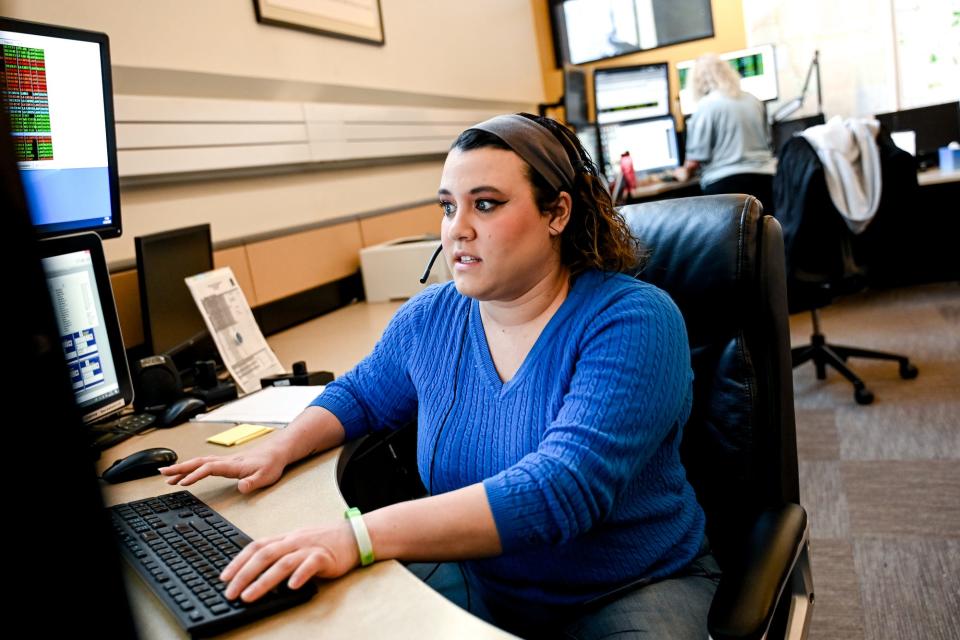
Hayley Hilburn, 28, said she knew what she was getting herself into when she started working as a 911 dispatcher in Ingham County.
“My grandma was a dispatcher for Flint Township, so it was kind of one of those times things came to full fruition,” she said.
The 12-hour shifts, stretches spent without a day off and mandatory overtime might have been “a shock-and-a-half,” otherwise, Hilburn said.
“I’m on a seven-day stretch right now,” she said when she spoke to the State Journal in late April, "but I’ve gone stretches where I work 15 or 16 days in a row. Some people work more than that.”
Hilburn says she worked 470 hours of overtime between June and the end of December 2022. That's because there are six vacant positions in Ingham County’s 911 Center, Davidson said.
“In the amount of time I've worked in this profession we were fully staffed once for about a week,” she said, which puts centers like hers in “a vicious cycle.”
“I have mandatory minimum staffing, meaning I have to have 11 people and a supervisor out there every day 24/7,” Davidson said. “What does that do? Well, that means less time at home, which means your work-life balance is probably bad. Obviously, we do everything we can to mitigate it. We have to continue to get the numbers up in the staffing and then get people trained.”
There are an estimated 2,200 public safety telecommunicators in Michigan handling “an average of 6.4 million emergency calls and texts” to 911 a year, according to a resolution passed in the state Senate last month urging Congress to reclassify dispatchers from office and administrative support to first responders.
Many of the centers those dispatchers work in, and others across the U.S., are understaffed by an average of 30%, said April Heinze, who works for the National Emergency Number Association. She's the organization's 911 and public safety answering point operations director. 911 centers that are fully staffed and fully trained are “unicorns,” she said.
In the U.S. 70% of public safety telecommunicators are female, according to Data USA, a website that uses public government data to compile statistics.
New dispatchers spend six months to a year learning an area’s geography, the system, and the nuances of the job before they sit at a console by themselves. Davidson, who was hired to work 911 dispatch in 2001, said even though the completion rate has improved, one in four new hires in Ingham County don't make it through training.
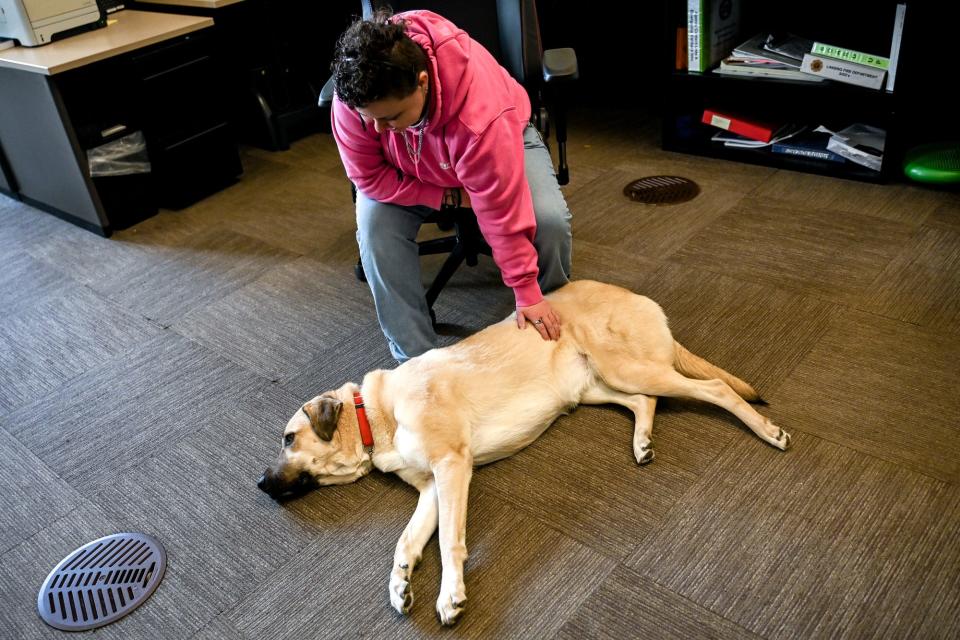
Understaffing issues prompted the Capitol City Labor Program Inc., the union representing Ingham County’s 911 dispatchers, to send a letter outlining the issue to State Sen. Sarah Anthony, D-Lansing, last month.
“Chronic understaffing creates undue stress, as well as operational and personal challenges,” read the letter. “In 2022 our members worked more than 35,000 hours of overtime with the median being 832 hours per dispatcher.”
Burnout, overtime and the mental challenges associated with the job haven't helped with turnover at the state's 911 centers, Harvey said. The average length of time dispatchers stay in the profession was, until a few years ago, three to five years, she said.
"I can’t tell you what it is now, but I would say it’s an average of one to three years," Harvey said. "Staffing 911 has been very difficult for at least 10 years. This is the worst it's been."
Dispatch center leadership in the state is actively talking about recruitment and retention, she said.
"But there's absolutely no easy fix for it," Harvey said.
Clinton County’s 911 Center, like Ingham County's, isn’t fully staffed either — the center has two open positions, Director Christine Collom said.
Eaton County's is fully staffed for the first time in Cunningham’s career.
The staffing has allowed the center’s dispatchers opportunities to take part in more outreach within the community and spend more time with their families and loved ones, Howland said.
READ MORE:
Can new apartments spur business growth in downtown Lansing without state workers returning?
$4M food incubator with 6 on-site restaurants coming to downtown Lansing's Knapp's Centre
Push to re-classify dispatchers could help profession, advocates say
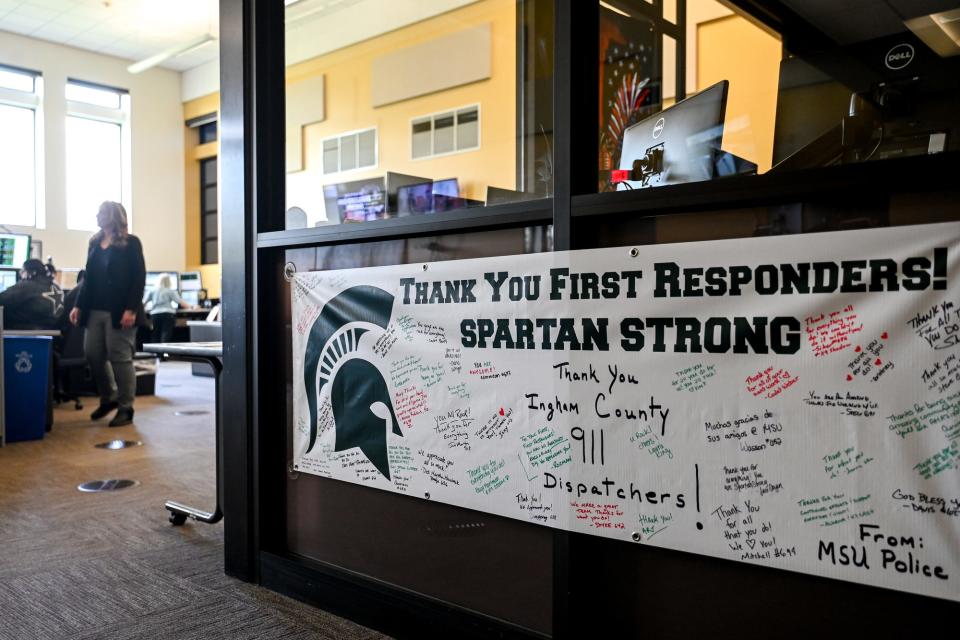
Advocates are pushing to reclassify 911 dispatchers, currently deemed "office and administrative support" staff in Michigan and the U.S., as first responders. That would ensure they receive training, funding and counseling services after emergencies they had a hand in responding to.
Anthony and Sam Singh, D-East Lansing, have been looking since February at changes that would benefit 911 dispatchers, including whether to propose amending a state statute, Public Act 312, though Singh said nothing has been introduced yet.
The statute allows first responders access to binding arbitration during contract negotiations, and that's an option 911 dispatchers at consolidated centers don’t have right now, said Bradley Richman, director of operations for Capitol City Labor Program.
Including dispatchers in the statute would give dispatchers in unions more bargaining power and could lead to pay increases in the profession, Heinze said. The median hourly salary across the country is between $18 and $22, though there are centers that pay less, said Heinze. Ingham County pays the highest rate locally, an hourly rate of $21.75 to start. The job tops out at $29.89 an hour in year eight on the job, Davidson said.
Efforts to reclassify dispatchers on a federal level also haven't progressed, despite bills being introduced, both in 2019 and 2021. U.S. Rep. Elissa Slotkin, a Democrat, said the legislation was bipartisan.
She expects the measure to be re-introduced this year.
The MSU shooting shed light on how crucial 911 dispatchers are in an emergency, Slotkin said, and could provide a new understanding of why it’s important to designate them as first responders.
“I feel like it gave people maybe their first glimpse of what it's like to be a 911 dispatcher,” she said. “And I think for a lot of people, it woke them up that there's this group of, frankly, mostly women who are handling these crises so that the first responders can get where they need to go.”
Despite the long hours and inevitable stress of the job, the profession has grown on Ashley Pasikowski, 22, who started working as a dispatcher for Ingham County in March of last year.
"Shortly after I finished training, I got a couple of higher priority calls right off the bat and I just kind of knew this is something I'm good at and this is something I can see doing long term," Pasikowski said. "No one calls 911 because they're having a good day. They call because it's possibly the worst day of their life and getting them the help that they needed at that moment, it makes me feel good to help somebody else and that's something that I've always wanted in a career."
Contact Rachel Greco at rgreco@lsj.com. Follow her on Twitter @GrecoatLSJ .
This article originally appeared on Lansing State Journal: Michigan's 911 centers are struggling with vacancies, burnout

